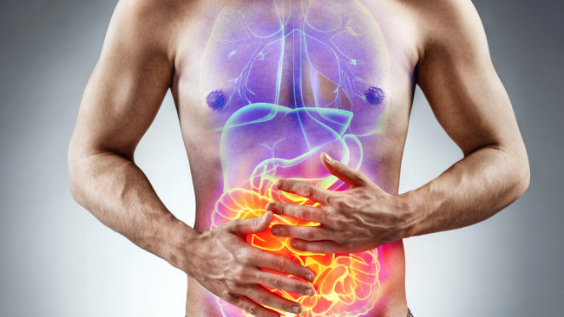
In traditional Chinese medicine and Intestinal abscess is an accumulation of focal Damp and Toxic Heat, usually in the left or right iliac fossa. In the acute stage, Intestinal abscess is characterised by excess Heat and stagnation of both qi and Blood. In subacute or chronic cases, the pattern is generally one of excess and stagnation, with or without deficiency and Cold.
Acute Intestinal abscess tends to be more common in younger individuals, whose diagnosis is usually quite straight forward. In elderly patients and those with weak qi, the manifestations, when there is fairly serious illness, may be subdued, and the diagnosis more obscure.
In the Western clinic, chronic or subacute cases are more often seen than acute Intestinal abscesses. Chronic abscesses generally lack the obvious signs of acute Heat, such as fever and chills or rigors, malaise, sweating, nausea and vomiting. The chronic presentation is generally characterised by a fixed lower abdominal pain, and possibly a mass upon palpation. It may be that cases are associated with a low grade or dormat focus of infection that has been isolated from the rest of the body in such a way as to render it inaccessible to the body’s immune system.
In biomedical terms, a traditional Chinese medicine defined Intestinal abscess has most commonly been associated with acute appendicitis. However, numerous biomedical diseases may fall into the traditional Chinese medicine category of Intestinal abscess. Once one of the most common acute abdominal disorders, the incidence of acute appendicitis is decreasing in the developed world, and more chronic disorders, such as diverticulitis and diverticulosis, are becoming more common.

Aetiology
Diet
Various dietary factors can contribute to Intestinal abscess. Overeating, frequently varying the quantity of food consumed and eating irregularly or at odd hours, can all disrupt Spleen and Stomach qi and lead to food stagnation. Too much cold natured or raw food weakens Spleen qi and yang. Over consumption in general, and excessive consumption of rich and hot natured foods in particular, can lead to the accumulation of food and Damp Heat in the Intestines. Some specific types of foods are thought to be particularly liable to create foci around which stagnation can build, in particular some difficult to digest seeds, pips and nuts.
Food stagnation can cause Damp Heat accumulation and Intestinal abscess. By habitually overloading the Spleen and Stomach and exceeding their capacities to process food ingested, the food lingers longer than it should, accumulating and stagnating. This stagnation can produce Heat which intensifies the process of putrefaction. The Spleen and Stomach are weakened, further inhibiting their abilities to perform their digestive tasks efficiently. The weakened Spleen produces Damp which combines with the Heat to produce Damp Heat, further impending the descent of Stomach and Large Intestine qi. If the stagnation intensifies further it becomes ‘Toxic’, and an Intestinal abscess is formed.
Emotions
The gastrointestinal tract is sensitive to, and easily disturbed by emotion, indeed the gut is perhaps the most common area of the body to store difficult to process emotional patterns. Due to the relationship between the yin and yang organ systems, the emotions that affect a primary zang may be stored in the partner fu. In the case of Intestinal abscess, the main emotional patterns are those that affect the Liver, Spleen and Lungs. These include anger, resentment and repressed emotions, grief, separation and loss and sadness.
These emotional elements are generally insufficient in themselves to generate Intestinal abscesses. They can, however, predispose an individual to a variety of complaints involving the Large Intestine, including Intestinal abscess.
Stagnation of Liver qi contributes ti Intestinal abscess formation by causing a spasm and inefficient peristalsis in the Intestines, leading to focal accumulation. Chronic Liver qi stagnation can cause other complications. The prolonged pressure can create Heat, which can combine with any Dampness present to generate Damp Heat. Long term qi stagnation can also lead to Blood stagnation.
The emotions experienced following the death or absence of a parent or loved one, a sudden change from a comfortable routine to an unfamiliar one (such as starting school), or physical and social isolation, can cause Lung qi to accumulate. The Lung system, which incorporates the Large Intestine, is affected, and qi begins to knot.
In addition to the emotional factors that upset the Liver and Lungs, worry, obsessive thinking and prolonged concentration, in combination with a sedentary lifestyle and poor diet, will weaken Spleen qi, predisposing it to (or inviting) invasion by Liver qi, resulting in further damage.

External Pathogenic Invasion
External pathogens are a less common than diet and emotions as a cause of Intestinal abscess. However, both Damp Heat and Cold can invade and accumulate in the gastrointestinal tract. The prolonged presence of a Cold pathogen, from the diet or environment, disrupts the local circulation of qi and Blood. Because Cold is such an efficient obstructor, it can easily generate the Heat necessary to damage tissue and create an abscess. Damp Heat is usually a seasonal invader, contributing to diarrhea or dysenteric disorder. Damp Heat has a tendency to linger and can sometimes be difficult to completely eradicate. Any residue Damp Heat can smoulder at a particular locus in the Large Intestine, promoting the conditions for abscess formulation.
Trauma
A trauma to the abdomen and Intestines, either from a previous intestinal illness, surgery, or penetrating or blunt injury, can cause localised Blood stagnation and the formation of a mass. Once a Blood stagnation mass is present, it will further impede qi and Blood circulation, potentially generating the necessary Heat for acute abscess formation.
Treatment
In the treatment of Intestinal Abscess, the treatment priority is based on three principles which take priority at different stages:
1. Open the bowels
2. Clearing Damp Heat and Toxic Heat
3. Regulate Bloody and eliminate stagnant Blood
After a diagnosis from a qualified practitioner has been given, acupuncture is the treatment of choice and herbal medicines are recommended to support correcting any systemic imbalances that may be present.
Some Biomedical Causes of Intestinal Absces
- Acute appendicitis
- Appendicular abscess
- Chronic appendicitis
- Diverticulitis, diverticulosis
- Peritoneal abscess
- Peritonitis
- Abscesses in the pelvic basin
- Pelvic inflammatory disease, salpingtis
- Mesenteric adenitis
